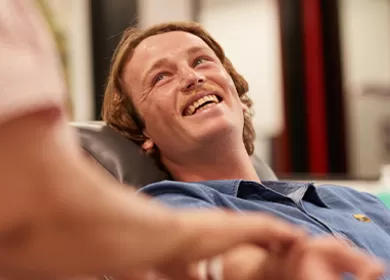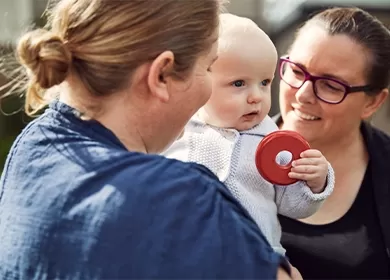300 Perth ‘super poopers’ needed now
Visit lifeblood.com.au/donors/microbiome to take our eligibility quiz
Perth residents are being asked to make a life-changing donation with a difference.
For the first time, Australian Red Cross Lifeblood is looking for 300 people to sign up to donate their poo as part of a Perth-based Microbiome pilot to help patients suffering from a serious and life-threatening bowel infection known as recurrent Clostridioides difficile infection (recurrent CDI).
As part of the pilot, Lifeblood supplies the processed stool product, known as faecal microbiota for transplant (FMT), to Fiona Stanley Hospital for patient treatments.
FMT is made by collecting stool from a healthy donor, testing and processing it, then supplying it to hospitals to transplant to patients.
Lifeblood Microbiome Manager, Elizabeth Connolly said although it might seem like an unusual request, people already rely on FMT to improve their day to day lives.
“Recurrent CDI is a terrible, debilitating condition,” Mrs Connolly said.
“Where traditional treatments like antibiotics haven’t helped, FMT effectively treats this infection for more than 90% of patients. Often all it takes is one treatment.”
“For those people, FMT can transform and in some cases even save lives.”
Mrs Connolly said 300 people were needed to sign-up as microbiota donors in the next month to help patients in need.
“Saving lives takes guts, and while we already have some wonderful donors, we are looking for more donors to join us so that we can supply FMT to more patients in need,” she said.
“We know there are people out there who have the power to change someone’s life, but at the moment all that potential is being flushed away.”
“If you’re aged over 18 and under 50, feel healthy and live in Perth you may be eligible to donate.”
To become a donor or learn more about Microbiome, please visit lifeblood.com.au/microbiome or call 1300 441 227.
Last year Lifeblood became Australia’s first TGA licenced FMT manufacturer and the only national not-for-profit FMT manufacturer in Australia.
In the future, Lifeblood also plans to supply FMT for use in research programs to treat other conditions such as ulcerative colitis, Crohn’s disease, major depressive disorders and in response to adverse events resultant from chemotherapy.
For our Microbiome work, Lifeblood has been grateful to receive contributions from HBF Health fund, the McCusker Charitable Foundation and Rotary WA.


